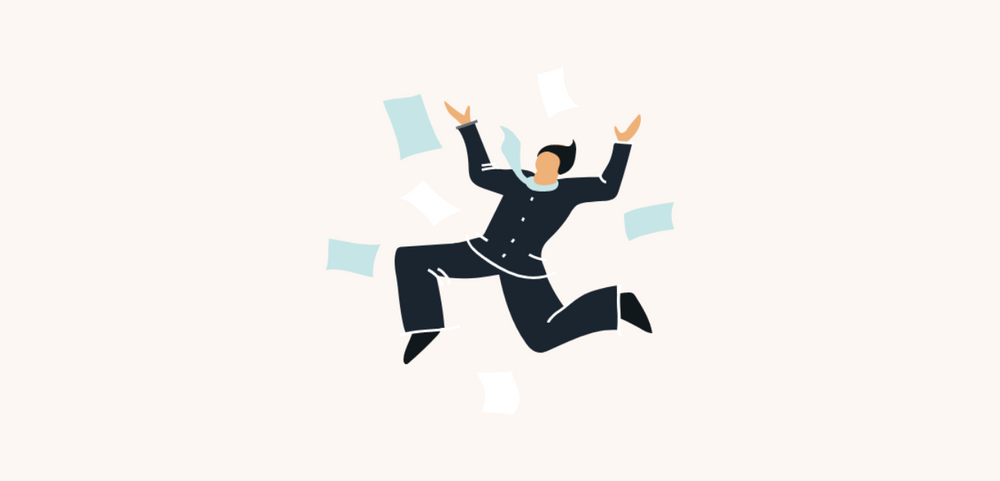The corona crisis does not only influence how we are working, but also affects the certainty of whether there will be work. For many people – from a restaurant owner to a young professional – this insecurity causes stress. Work and organizational psychologist Myrthe explains how this insecurity in our work life puts us off balance. Plus: 8 tips to help you manage stress.
A video call for work when you are surrounded by your family or roommates. Or a lonely day behind the laptop in your bedroom. No, working from home isn’t that fun. However, what if the current pandemic prevents you from finding a job as a recent graduate? Or causes you to lose your job after years of service? ‘At Open Up we see a significant increase in the conversation topic ‘work’,’ said Myrthe. ‘It is evident that the coronas crisis, besides worries about our physical health, also causes worries surrounding work and income. Before the crisis, questions were: how do I create the right balance between work and private life, or: how do I create overview and structure? Step by step, we can then work on insights and eventually on new, better fitting, work habits.
“Change is difficult, for everyone”
Because of the current crisis work changes are processed ad hoc, which can lead to stress and tension. Furthermore, situations arise suddenly, which makes them difficult to control and just not that workable. Think about working in a house full of people. Or needing to work digitally all of a sudden, while not being equipped with the right skills or knowledge to use those programs and techniques. For some people, the nature of their work also changes. For example, managers are searching for methods by which they can still convincingly lead their teams via video calls.
The impact of the pandemic also has its economic effects. Many people experience insecurity: what are the consequences of the crisis for my income, my career, my future, my family?’
It’s normal to feel stressed in times of change
In general it can be stated that corona impacts our work stress. According to Myrthe, this is not surprising: ‘Change is difficult, for everyone. When your structure disappears, your role suddenly changes, and your perspective becomes uncertain that can elicit emotions such as fear, sadness and anger. This is very normal, and not problematic in itself. However, if you experience those emotions too often and for too long, this can affect your mental well-being. You will notice when this happens. For example: you are ‘in your head’ a lot, you repetitively experience anxious thoughts, or you excessively ruminate.
“To break a vicious cycle of fear, sadness and anger, it is useful to first check whether your thoughts are true.”
You might also feel it in your body: you can feel shallow breathing or an accelerated heartbeat. Feeling this isn’t enjoyable, and once you get into this downward spiral in which complaints continue to persist, it is difficult to get out of it yourself. In such a situation talking to a psychologist might help you.
The situation at work might not be easily changed, but you can learn to think differently about the situation: milder, more constructive and by putting things in perspective. The strong emotions you experience might become less.’
Helping thoughts
‘To break a vicious cycle of fear, sadness and anger, it is useful to first check whether your thoughts are true. Are their alternative thoughts possible? Maybe you are scared to lose your job – how realistic is this actually? And when you would lose your job, what does that concretely mean to your social, societal and economic position? Might it offer new possibilities?
It often helps to put the situation in a broader perspective and to look at your resilience; in every life major life events happen. Check how friends or family members are doing after having lost a loved one, or after financial hardship. No matter how serious a life event is, a new balance is always created. We will experience a new normal in which we worry about small things such as doing the dishes. Our resilience is huge.’
8 tips for less stress – also in times of corona
Thinking differently about insecurities and events might help us to experience different emotions. In addition, there are some practical tips that can help you to limit works stress during corona:
-
Keep providing yourself with structure Determine per week what you need to do and what you want to do – even if you have an irregular work schedule or no work at all. Keep an eye on your energy level while doing this. Make a schedule and maintain a balance between activities that cost you energy and activities that give you energy. Do you have a family or roommates? Take that into consideration, and make sure they take you into consideration as well.
-
Do you work from home? Pretend every day as if you need to commute Make time for some exercise and some outdoor time. Take a small walk after your breakfast. End the day with a bike ride to the supermarket.
-
Take good care of your body Keep moving, eat healthy and ensure a steady sleep rhythm. This will not only help you keep your physical but also your emotional balance.
-
Not sleeping well? Make sure your head and body have less stimuli to process at least half an hour before bed time. Turn off all screens. Dim the lights and take a hot shower. Relaxation exercises can help as well.
-
Keep seeking connection Contact with other people is essential for us to feel good and energetic, also within the work context. Do you mostly speak to your colleagues over the phone or online? Open up and ask (personal) questions! Tell others: I experience difficulties, how do you experience this?
-
Stay connected with yourself What do you feel in your body? What does this tell you? Mindfulness and yoga exercises can help you to find more rest or relaxation.
-
Indicate your boundaries on time Investigate which signals your mind and body send you when you are going too far for too long. Deal with those signals assertively by putting selfcare first. In the work context this can be difficult. Make sure you keep or strengthen your resilience in other areas of life: for example seek support from friends or find relaxation by reading a book.
-
Test your thoughts You can do this by consulting someone else, but you can also do it by yourself: is it correct what I am thinking? Almost every person has a blind spot regarding their own thoughts and behavior. Can’t you figure it out by yourself? A conversation with a psychologist can be an efficient way to help you find more trust and rest.
Do you feel there is something else that helps you to reduce stress? Or do you feel that the above tips don’t help you? Reach out to our psychologists via [email protected]. Our psychologists are there to help.





